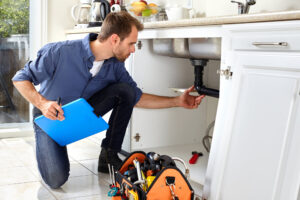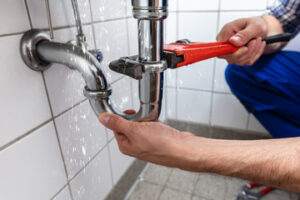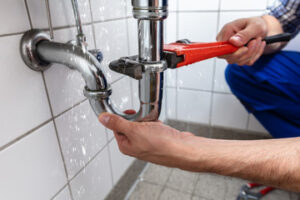Faucets are a fixture in your home and need to be properly maintained. Understanding the basics of faucet repair helps homeowners save money by completing simple jobs themselves.

Before beginning a faucet repair job, shut off water supply valves under sink and cover drain with rag or stopper to prevent losing small parts down the sink. Prepare a clean workspace and have tools and replacement parts (washers, O-rings) ready before starting. Contact Faucet Repair Houston for professional help.
The constant drip, drip, drip of a leaky faucet can drive homeowners crazy, but often, it’s a simple fix. The first step is shutting off the water supply, then removing the handle to get a closer look at the assembly. You may find a decorative plastic button that snaps off or a screw underneath, which you can remove with a screwdriver. If the screw is stuck, try using penetrating oil to help loosen it. If there’s a handle nut, you can unscrew it with a large pair of slip-joint pliers or an adjustable wrench. Once you’ve removed the handle, you can see what’s causing the leak—a worn O-ring, valve seat, or stem.
A leaking stem can usually be fixed by replacing the O-ring. This is an easy DIY task and can be done in just a few minutes. Just make sure the new O-ring is an exact fit to prevent future leaks. The next most common type of leak is from the valve seat itself. This can be a result of mineral buildup or the wrong-sized washer. A professional plumber can replace the washer and valve seat to stop the drip.
Some drips are due to loose parts farther down in the pipes, which can be difficult for homeowners to access and tighten. A professional plumber can come in to repair the leaking pipes and seals, and they can also advise homeowners on proper maintenance and care for their faucets.
To avoid a dripping faucet, regularly clean the aerator to eliminate mineral buildup. Regular cleaning can also prevent clogging and ensure steady water flow. If the aerator isn’t removable, you can clean it by turning off the water and pulling out the tip with a pair of tweezers. Always use a gentle cleaner to avoid scratching or damaging the finish and components.
Fixing a Dripping Faucet
A constant drip from your faucet can be more than just an annoyance. Over time, it can create an ideal environment for mold and mildew to grow, posing health concerns for you and your family. It can also lead to water stains, weakened fixtures, and even wood damage in your home. In addition, a constantly dripping faucet wastes money and increases your water bill.
Luckily, you can often fix a dripping faucet by tightening loose components or replacing worn ones. Most of these repairs are simple and inexpensive, but if your leaky faucet persists, it may be time to call in a professional plumber.
First, shut off the water supply. It’s important to do this before beginning any work, as water gushes out when you remove small parts from the faucet. You’ll also want to close the sink drain, as any parts you remove could fall down the drain and get lost.
Begin by removing the handle, packing nut, and stem. You can usually unscrew these with a pair of pliers, but you may have to use a wrench for some models. Once the components are removed, you can begin to examine them for issues that might be causing your leaking faucet. A leaking faucet can often be caused by a damaged or worn O-ring, washer, or valve seat. Replace these with exact matches for your faucet to avoid future leaks.
Inspect the cartridge, stem, and spout for any cracks or holes that might be causing your leak. You can often repair these with epoxy, but if you see severe damage, it’s best to just replace them with new parts. Once you’ve replaced the worn or corroded parts, reassemble your faucet and turn the water back on to test for any remaining leaks.
Many homeowners encounter problems with their dripping faucet after they’ve attempted a DIY fix. In these cases, it’s often best to call in a professional plumber to ensure the job is done correctly. A plumber can also provide you with additional advice and tips on how to keep your faucet in good working condition.
Fixing a Faucet That Won’t Turn On
A faucet that won’t turn on can be frustrating. But, if you know how to troubleshoot the problem, it may not be as bad as it seems. If you’re not confident in your DIY plumbing skills, it’s always a good idea to seek expert help from a plumber.
Turn Off the Water Supply
Before you start working on your faucet, you need to make sure it’s completely shut off. This means locating the main water valve and turning it off. It’s also a good idea to check other faucets in the house to see if any others are experiencing problems. This will help you narrow down the issue and save time by focusing your efforts on the problematic tap.
Turning off the water supply can also prevent any accidental flooding while you’re working on your faucet. To do this, you’ll need to find the shut-off valves beneath the sink. They’re usually labeled and marked, but if you can’t find them, look for a small knob or handle on the top of the pipe. Gently and slowly turn this knob to stop the flow of water.
Next, remove the faucet handle to get a better view of the cartridge or valve. Look for any signs of damage and examine the nut and hex screw that hold the handle in place. If they’re damaged or missing, it could be the reason why your faucet won’t turn on.
If you can’t find any issues with the handle, it’s likely that the cartridge or valve is faulty. If this is the case, you’ll need to replace it to fix your faucet that won’t turn on. Before attempting this, though, it’s a good idea to clean the entire faucet and reassemble all the parts. This will help ensure that the new replacement is seated correctly and doesn’t leak.
Finally, it’s a good idea to test the water again to make sure it turns on and off correctly. If it doesn’t, it’s a good idea to contact a plumber for professional assistance. They’ll be able to inspect the problem further and provide expert solutions.
Fixing a Faucet That Won’t Drain
A faucet’s purpose is to turn running water into usable hot and cold water for kitchens, bathrooms, and laundry rooms. They’re also a focal point in a room and add to the overall aesthetic of a home.
However, a faucet that won’t drain can be frustrating and inconvenient for homeowners. Aside from a lack of functionality, it can also lead to water waste and potentially expensive repairs.
There are many reasons why a sink’s faucet might stop working, but there are several things homeowners can do to troubleshoot the issue before calling a professional plumber. For example, if the faucet isn’t producing hot water, it could be due to low pressure or a blocked pipe. If the faucet is dripping, it could be caused by worn washers or a loose O-ring. It may also be a sign that there is a leak in the piping or supply lines.
Another possible cause of a leaking faucet is that the cartridge is worn. This is a common issue in older homes with cartridge-style faucets. The cartridge is the component that opens and closes when you raise and lower the handle, and it controls the flow of water into the spout. It can be fixed by replacing the cartridge, which is a relatively easy DIY project.
If a faucet is making strange noises, it could be a sign that the aerator is dirty or that there is a blockage in the plumbing. Homeowners can try using vinegar to clean the aerator, but if the problem persists it’s best to call in a professional plumber to avoid unnecessary damage to your pipes.
If there is no water coming out of the faucet at all, it’s likely that there is a problem with the supply line valve or the connection to the wall. Homeowners can try tightening the nut that holds the supply line to the wall, but if they mess up, they’ll have a water geyser gushing out of the hole in their wall. It’s a good idea to call in a plumber to make sure the problem is resolved correctly and safely.







